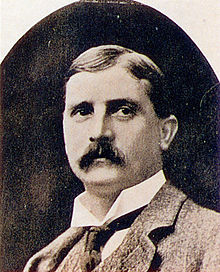Francis Aglen
|
Sir Francis Aglen GCMG KBE |
|
|---|---|
 |
|
| 3rd Inspector-General of the Chinese Maritime Customs Service | |
|
In office 25 October 1911 – 31 January 1927 |
|
| Preceded by | Sir Robert Bredon (OIG) |
| Succeeded by | A. H. F. Edwardes (OIG) |
| Personal details | |
| Born |
17 October 1869 Scarborough, Yorkshire, United Kingdom |
| Died | 26 May 1932 (aged 62) Meigle, Perthshire, Scotland, United Kingdom |
| Spouse(s) | Marion Agnes Balfour (1886–1925) Anna Moore Ritchie (1883–1971) |
| Occupation | Civil servant |
Sir Francis Arthur Aglen GCMG KBE (安格聯; 17 October 1869 – 26 May 1932) was a servant of the Chinese Imperial Customs, later to be the Chinese Maritime Customs, rising through the service to become Inspector-General of the Chinese Maritime Customs Service from 1911 to 1927 after the death of Sir Robert Hart.
Francis Arthur Aglen was born in Scarborough, North Yorkshire, England in 1869, the son of Archdeacon Anthony Stocker Aglen and Margaret Elizabeth Mackenzie, and was educated at Marlborough College in Wiltshire. Joining the Imperial Maritime Customs Service in 1888, Aglen served in many customs postings such as in Peking, Amoy, Canton and Tientsin. By 1897 he was appointed Deputy Commissioner to the customs tax division, and by 1904 he had become Customs Commissioner and Chief Secretary of Customs in the capital of Peking, for which he was honoured by the Qing government with the Third Class, First Grade, of the Imperial Order of the Double Dragon.
When Sir Robert Hart fell ill in 1908 and returned to Britain, the Chinese government insisted he retain his title of Inspector-General but appointed customs commissioner Sir Robert Bredon to Officiate in Hart's place. When Bredon resigned in June 1910, Aglen served as Officiating Inspector-General from 17 June. When Hart eventually died, Aglen was made full Inspector-General on 25 October 1911. Coming to office not long after the Xinhai Revolution had deposed the Qing dynasty, Aglen found himself heading a Chinese government department for a Republican administration whose influence often did not extend beyond Peking. Owing to the chaotic situation in China and the threat that instability posed to the security of customs revenues, Aglen sought and was authorised with the power to collect all receipts and supervised the collection of all revenues by an international commission of Bankers in Shanghai.
...
Wikipedia
